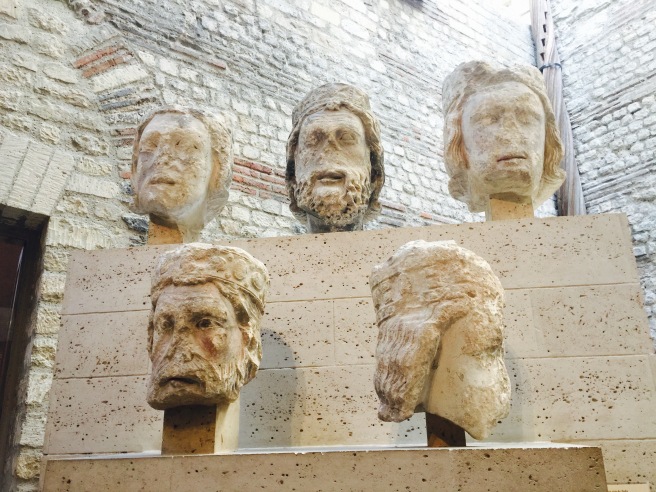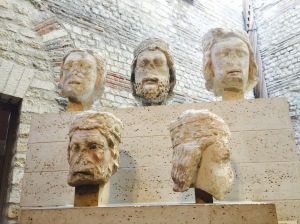
That there are darker, rawer things that I am scribbling down and not posting on this blog is something I confess to John and to Tita & Drew—who are both writers—at dinner after martinis and wine and a perfect piece of salmon.
That sometimes I do not post here unless I can pull the threads together somehow, unless there is a graceful metaphor in which to seek refuge and shape for this mess. That sometimes I worry that I function more like the PR team for Nina Riggs, Cancer Patient, rather than a terrified set of eyes staring into an unlit room.
That there are rough, ugly thoughts and scraps of prose that don’t fit. Where do I put them?
Here is one: In Paris it seemed like every single woman had two perfect breasts, each unscathed and rightfully hers, and no one else was just wandering about like a marked person with a time bomb strapped to her body (Je suis une terroriste I thought more than once, and every time I heard the wail of a siren I imagined it coming for me—or in my wake.). What a lie—a total impossibility—but I could not identify the ravaged look on anyone’s faces, though I tried. It was my failure, I’m sure. Maybe it translates differently. Maybe it was just that all I could see everywhere was the last version of myself in Paris: age 24, intact.
Here’s another: I hardly remember how romance works.
And one more: The grey then yellow light bouncing off the Seine in through the unshuttered windows of the apartment we were loaned on the Île de la Cité was so exquisite that I lay awake crying until my stomach balled and ached and I spent most of the night in the bathroom, missing my mom so bad because I could not call her and tell her, and all I could hear was her voice exclaiming about these very apartment buildings on my first trip to Paris at age 16 as we raced along the quai in our taxi: Who in the world lives there?! Can you even imagine!?
The other day, Tita and I discussed this writing issue some more in her minivan on our way home from an afternoon of very radioactive scans at Duke. Tita told me about an essay she’d just read about writing inside a very tiny space that makes you feel like you are held and safe and you can open yourself up to say the scary things and about a lit class she took in college called Studies in Evil. In the Evil class, they’d read Beowulf and Richard III and Genesis and explored how afraid we are as a culture of images of uncontained chaos (example: disembowelment). The professor had called them Images of the Abject. How we contain things and give shape to things in order to be less afraid of them.
Yes. The crafted idea does this. The metaphor does this. The intact body does, too.
In Paris we visited the Cluny Museum, full of artifacts and art from the Middle Ages. The most famous things there are the Lady and the Unicorn tapestries, which are just the absolute best—if you love strangeness and symbolism and mystery.
But this time it was the collection of life-sized stone Jesuses from the 14th century that did it for me—on the way to the cross, on the cross, dead in Mary’s arms—so human and agonized and open-faced and accepting all at once. Complicated eyes, resolved lips. I couldn’t help notice in the emotionally brutal pietà, though, that Jesus’s wounds were still the daintiest of paper cuts. No chaos.
Reveal the pain, but hide the wreckage.
Another thing I loved: a tremendous limestone-y room full of rows of giant sculpted heads—most of them ghostly white, only flecked with the occasional remaining paint chip: the once-rouge of a cheek, the once-blue of a crown. The labels read: ca. 1220, Les têtes des rois and Les têtes des anges. The heads of kings, the heads of angels, taken from the façade of Notre-Dame. And then, along a separate wall, a gallery of the bodies, lined up in rows like a choir, that I suppose the heads had once belonged to. Les corps.
I stared into their huge vacant faces. I liked the ones with parted lips the most, as if they’d been interrupted and had been waiting patiently these eight centuries to talk again. That’s what was in their faces that I liked: vacancy achieved through patience. It also made me want to bash their faces in and taste the stone as a powder.
Somehow I still don’t know what’s next. Somehow tomorrow is still the day I’m supposed to see the Queen and I am still staring very hard into the dark room. Somehow tomorrow school is canceled and the internet is calling for a treacherous morning across the region: wet snow, turning to ice—maybe later turning to rain.

